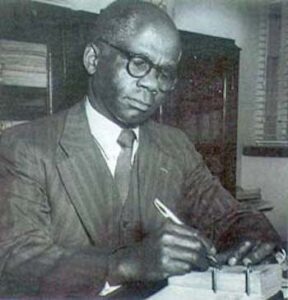
Alfred Xuma
*Alfred Xuma was born on March 8, 1893. He was a Black South African agronomist, activist, and doctor.
Alfred Bahtini Xuma was from the Manzana, Ngcobo District, in the Eastern Cape of South Africa. Xuma was the seventh child of Abraham Mangali Xuma and Elizabeth Cupase Xuma, devout members of the Wesleyan Church. Xuma and his brothers were responsible for herding and milking their father's livestock and learned to work the fields with an oxen-led plow.
Xuma began attending the local Anglican-run primary school when he was six or seven. At 14, he had already passed standard five and had completed his primary school. Xuma was almost 15 when his father encouraged him to enroll at Clarkebury, a Wesleyan missionary institution, in January 1908. Clarkebury was among the oldest missions in the Transkei. Six weeks after being readmitted to Clarkebury, Xuma passed the provincially administered 'P.T.3' exam, qualifying him to teach in the higher primary standards.
He was 18 years old. Between 1912 and 1913, Xuma taught at two primary schools. In 1913, he enrolled at Tuskegee University, worked on the Institute's farm, and planned to spend his first year studying agriculture. He was a member of the Alpha Phi Alpha fraternity. Nelson Ricks, an instructor at Tuskegee, encouraged Xuma to continue his studies at the University of Minnesota, where Ricks had graduated.
Xuma arrived in St. Paul in 1916 and was admitted to the College of Agriculture in early 1917. In the early 20th century, Blacks comprised less than half a percent of Minnesota's total population, and very few Black students attended the University. In 1917-18, the University had only two students from Africa. While attending, he lived in St. Paul's Rondo community and made friends with Roy Wilkins at St. James African Methodist Episcopal Church in St. Paul. Xuma graduated from the University in June 1920, earning a Bachelor of Science degree from what was then the College of Agriculture, Forestry, and Home Economics. Xuma went on to earn his M.D. in 1926 from Northwestern's medical school.
He returned to South Africa in late 1927 and settled in Sophiatown, one of the few neighborhoods in Johannesburg where Black people could own property. Although on the left wing of the ANC, Xuma was seen as too conservative by an increasingly impatient and activist youth, whom he regarded in turn with suspicion. Nevertheless, under his leadership, the ANC established its Youth League in 1942. A young Nelson Mandela, Walter Sisulu, Congress Mbata, and William Nkomo were among the activists present.
In 1944, they visited his home in Sophiatown to agitate for his acceptance of the league's manifesto and draft constitution. Mandela recalls having been impressed at how "grand" Xuma's house was and by his revitalization of the ANC: Xuma had succeeded in regularizing membership and subscriptions and had greatly improved the movement's finances. To Mandela and many other young Africans, he represented the old way of doing things: deputations, statements, committees—gentlemen politics in the British tradition. As a man so recently being groomed to become a 'black Englishman' himself, Mandela understood how all that worked. But now, new voices were around him, offering an increasingly militant approach.
As a leader and activist, he was president-general of the African National Congress (ANC) from 1940 to 1949Alfred Xuma was the first Black South African to practice as a medical doctor in South Africa; he died on January 27, 1962. After his death, his book collection was given to Orlando East Public Library by his widow, Madie Hall Xuma. This library was the first purpose-built public library in Soweto. His home currently serves as the Sophiatown Heritage and Cultural Centre.